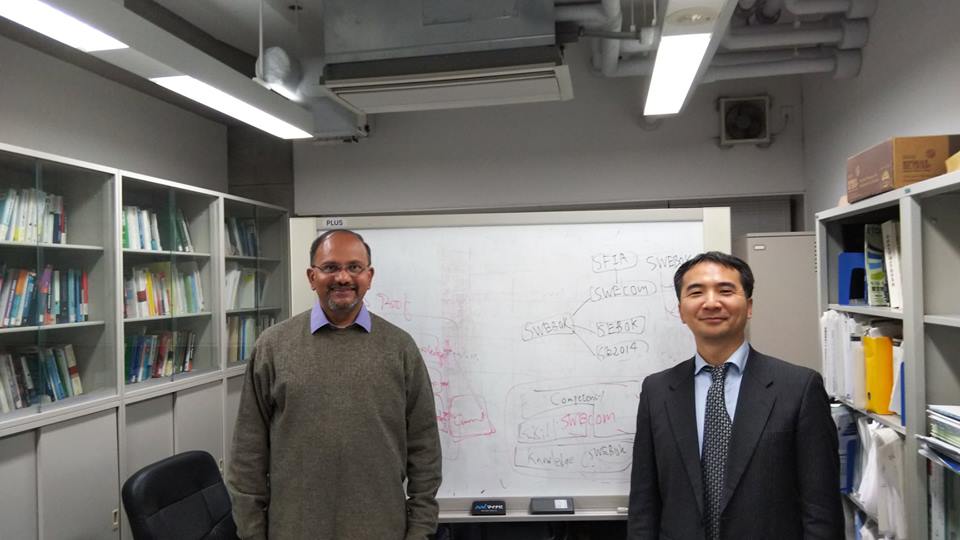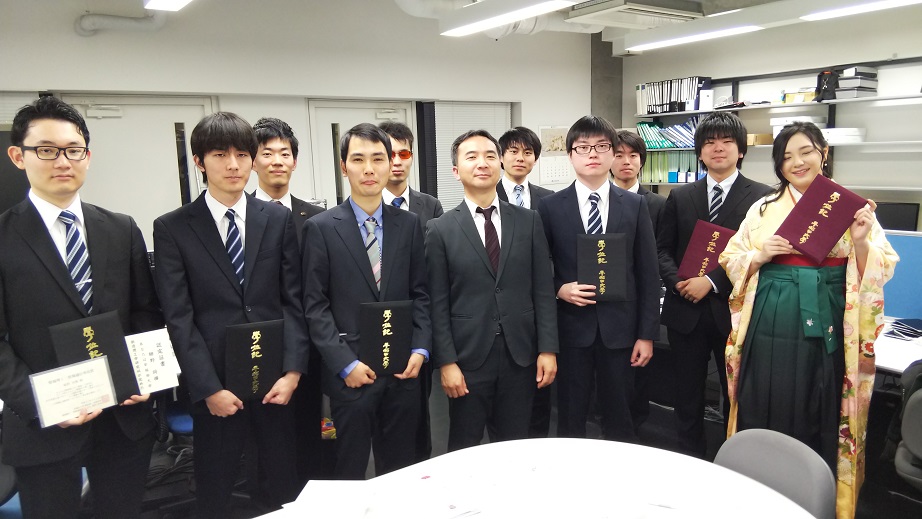On March 29 2019, Yathi Tarikere-san from IEEE CS visited us to discuss SWEBOK and related models and lead development of comprehensive professional body of knowledge, skills and competencies. IEEE CS Yati氏が来日されSWEBOK等の今後を詳しく検討。IEEE CS PEABにて包括的な体系づくりをリードしてまいります。
9 students successfully graduated. Congratulations!
9 students successfully graduated. Congrats on your graduation! Yasuhiro is selected as representative of all graduates of FSE. He received certificate on behalf of all FSE graduates given by the University president. This is 2nd time to have representative from our lab; last time Ryosuke Tsuchiya was selected 2015. Moreover, Ryosuke, Yuichiro, Yasuhiro and Masaki received Dept. Awards.
AsianPLoP 2019 was successfully over!
AsianPLoP 2019: 8th Asian Conference on Pattern Languages of Programs was successfully held at Life is Tech!, Tokyo, from Mar 20-22 2019. There were great discussions on patterns and patterns languages in software and non-software fields. Many thanks to Life is Tech!, Chairs, Shepherds, PC members, authors and participants. Photos were taken by Joesph Yoder; He supported the conference a lot.


Recovering Transitive Traceability Links among Various Software Artifacts for Developers, accepted for IEICE Trans. Info&Sys (SCIE, Scopus indexed)
Ryosuke Tsuchiya, Kazuki Nishikawa, Hironori Washizaki, Yoshiaki Fukazawa, Yuya Shinohara, Keishi Oshima, Ryota Mibe, “Recovering Transitive Traceability Links among Various Software Artifacts for Developers,” IEICE Transactions on Information and Systems, pp. 1-10, 2019 (SCIE, Scopus indexed)(to appear)
Traceability links between software artifacts can assist in several software development tasks. There are some automatic traceability recovery methods to ease managing the massive number of software artifacts and their relationships. However, they cannot work well for software artifacts whose description are different in terms of language or abstract level. To cover weakness of them, herein we propose Connecting Links Method (CLM), which recovers transitive traceability links between two artifacts by intermediating the third artifact. In order to apply CLM for general use without limitation of software artifact types, we have designed the standardized method to calculate relation score of transitive traceability links using the scores of direct traceability links between three artifacts. Furthermore, we propose improvement of CLM by considering software version. Then, we have evaluated CLM by applying it to three software products. As a result, we have confirmed that CLM has the potential to be more applicable for software artifacts whose language type or vocabulary are different than previous methods using textual similarity.
Applying Gamification to Motivate Students to Write High-Quality Code in Programming Assignments accepted for ACM ITiCSE 2019 (CORE Rank A)
Remin Kasahara, Kazunori Sakamoto, Hironori Washizaki, Yoshiaki Fukazawa, “Applying Gamification to Motivate Students to Write High-Quality Code in Programming Assignments,” 24th ACM Annual Conference on Innovation and Technology in Computer Science Education (ACM ITiCSE 2019), Aberdeen, UK, 15-17 July 2019. (CORE Rank A)(acceptance rate 28% = 67/243)
Call for Participation AsianPLoP 2019: 8th Asian Conference on Pattern Languages of Programs
*Call for Participation*
AsianPLoP 2019
8th Asian Conference on Pattern Languages of Programs
Mar 20-22, 2019, Tokyo, Japan
http://asianplop.org
https://pl.csie.ntut.edu.tw/asianplop2019/
PLoP 2019 is a PLoP(R) Conference sanctioned by the Hillside Group.
PLoP is a registered trademark of the Hillside Group.
*Objective and Motivation*
A pattern is a solution to a recurring problem in a certain context
where numerous forces are felt. Patterns enable people to share
experience-based proven solutions in designing products, managing
processes, projects and organizations, and communicating with each
other more efficiently and effectively.
Asian Conference on Pattern Languages of Programs (AsianPLoP) will
take place for the eighth time, as a premier event for pattern authors
and users to get together, discuss and learn more about patterns and
pattern languages in the Asia region as well as other regions. The
purpose of AsianPLoP is to promote development of patterns, pattern
languages, technologies and experiences of patterns primarily about
software as well as domains.
*Invited Talk*
Yasutomo Sanui (Life is Tech!)
*Focused Workshops*
Idea Mining Workshop Using A Style Language for Enjoying Japan
Pattern Writing Workshop in Machine Learning Engineering
Agile Quality Workshop
*List of papers accepted*
Abstract and IoT security segmentation patterns
A Pattern for NFV Management and Orchestration
Misuse Patterns for NFV based on Privilege Escalation
Deployment Patterns for Confidence
The modeling pattern of human and society for AI business
本人・家族のための遺産相続の相談に関するパタン
習慣とダンスしよう – 日常生活でパターンを見つけ、使いこなすためのパターンランゲージ
AIで予想をするだけでなく説明もしよう。
誰もが生き生きと働ける社会を導く ユニバーサル・キャリアデザイン・パターン
*Venue*
Life is Tech!
2-12-3 Minamiazabu, Minato-ku, Tokyo 1060047 Japan
5min walk from Shirokane-takanawa Station
(Tokyo Metro, Tokyo Subway)
*Conference Program*
Mar 20
15:00 – 17:30 Pattern writing bootcamp
18:00 – Welcome reception at somewhere nearby
Mar 21
09:00 – 09:30 Opening and Introduction led by chairs
09:30 – 10:30 Game and Break (and Reading time)
10:30 – 12:00 Writer’s Workshop E1, J1
12:00 – 13:00 Lunch
13:00 – 14:00 Invited talk: Yasutomo Sanui (Life is Tech!)
14:00 – 15:30 Writer’s Workshop E2, J2
15:30 – 16:30 Game and Break (and Reading time)
16:30 – 18:00 Focused Workshops
a. Idea Mining Workshop Using “A Style Language for Enjoying Japan”
b. Pattern Writing Workshop in Machine Learning Engineering
18:00 – 18:15 Wrap-up 1st day
18:30 – Dinner at somewhere nearby
Mar 22
09:30 – 10:00 Overview and Game
10:00 – 11:30 Writer’s Workshop E3, J3
11:30 – 12:30 Lunch
12:30 – 14:00 Writer’s Workshop E4, Writing Group J4
14:00 – 15:00 Game and Break (and Reading time)
15:00 – 16:30 Writing Group J5, Agile Quality Workshop
16:30 – 17:00 Break
17:00 – 18:00 Retrospective and Closing Game
*Machine Learning Engineering Group*
In addition to the above-mentioned general topics, this year AsianPLoP
organizers collaborate with JSSST Special Interest Group on Machine
Learning Systems (MLSE, https://mlxse.connpass.com/ ).
*Registration*
https://register.hillside.net/asianplop-registration/
*Conference Committee*
General Chair:
Hironori Washizaki, Waseda University / NII / SYSTEM INFORMATION
/ eXmotion, Japan
Program Chairs:
Taichi Isaku, Keio Research Institute at SFC & CoCooking, Japan
Joseph Yoder, The Refactory Inc., USA
Nobukazu Yoshioka, National Institute of Informatics, Japan
Web Chairs:
Teddy Lee, Taipei Tech, Taiwan
Yu Chin Cheng, Taipei Tech, Taiwan
Program Committee:
Ademar Aguiar, Universidade do Porto
Arisa Kamata
Bimlesh Wadhwa, National University of Singapore
Christian Kohls, Technische Hochschule Koln
Chu-Ti Lin, National Chiayi University
Eduardo Guerra, National Institute of Space Research
Eduardo Fernandez, Florida Atlantic University
Emiliano Tramontana, Dipartimento di Matematica e Informatica, University of Catania
Foutse Khomh, DGIGL, Ecole Polytechnique de Montreal
Hironori Washizaki, Waseda University
Jiwon Kim
Joseph Yoder, The Refactory, Inc.
Jung-Sing Jwo, Tunghai University
Kai Chang, Auburn University
Nobukazu Yoshioka, National Institute of Informatics
Norihiro Yoshida, Nagoya University
Shang-Pin Ma, National Taiwan Ocean University
Shinpei Hayashi, The University of Tokyo
Sumit Kaira, IIT Kanpur
Taichi Isaku, Keio Research Institute at SFC & CoCooking, Japan
Takashi Iba, Keio University, Japan
Teddy Lee, National Taipei University of Technology
Y C Cheng, National Taipei University of Technology
Yuma Akado
================================================================
Landscape of IoT Patterns accepted for SERP4IoT 2019
Hironori Washizaki, Nobukazu Yoshioka, Atsuo Hazeyama, Takehisa Kato, Haruhiko Kaiya, Shinpei Ogata, Takao Okubo and Eduardo B. Fernandez, “Landscape of IoT Patterns,” short paper, 1st International Workshop on Software Engineering Research & Practices for the Internet of Things (SERP4IoT 2019), Colocated with the 41st ACM/IEEE International Conference on Software Engineering ICSE 2019, Montréal, QC, Canada: Monday 27 May 2019.
Patterns are encapsulations of problems and solutions under specific contexts. As the industry is realizing many successes (and failures) in IoT systems development and operations, many IoT patterns have been published such as IoT design patterns and IoT architecture patterns. Because these patterns are not well classified, their adoption does not live up to their potential. To understand the reasons, this paper analyzes an extensive set of published IoT architecture and design patterns according to several dimensions and outlines directions for improvements in publishing and adopting IoT patterns.
Deployment Patterns for Confidence, accepted for Writer’s Workshop at AsianPLoP 2019 Tokyo
Joseph W. Yoder, Ademar Aguiar, Hironori Washizaki, “Deployment Patterns for Confidence,” Writer’s Workshop, 8th Asian Conference on Pattern Languages of Programs (AsianPLoP 2019), Mar 20-22, Life is Tech! Tokyo.
参加募集: 国際規格に基づくソフトウェア品質の測定評価と認証セミナー (2019年4月19日)
■参加募集
国際規格SQuaREに基づくソフトウェア品質の測定評価と認証セミナー
2019年4月19日(金)18:00-20:00 早稲田大学(参加無料)
システムやソフトウェアの品質要求および評価の国際規格 ISO/IEC 25000 SQuaRE シリーズの概要と改定内容、応用としての品質定量評価枠組みWSQB/WSQF(ICSE 2019発表)および品質認証制度PSQ認証の改定内容を詳しく解説します。
早稲田大学ではIPA 委託事業としてISO/IEC/JTC1 SC7/WG6 関係者やコンピュータソフトウェア協会等と連携し、SQuaRE シリーズを具体化してパッケージ製品やクラウドサービスの品質を体系的に定量評価する枠組みを実現、国内20製品超へ適用しました。その結果は国際的に評価され、世界最難関会議 ACM/IEEE ICSE 2019 に採択、さらには使いやすさを向上させる形で枠組みを改訂中です。その内容と活用事例を詳しく解説します。
加えて本セミナーでは SQuaRE シリーズの 2020 年に向けた大幅な改訂状況ならびに SQuaRE シリーズに基づく品質認証制度 PSQ 認証のPSQ-Lite, Standard, Premium への大幅リニューアルについて詳しく解説します。参加費無料です。ぜひご参加ください。
共催: 情報処理学会 情報規格調査会JTC 1/SC 7専門委員会
文部科学省社会人教育事業enPiT-Pro スマートエスイー
コンピュータソフトウェア協会(CSAJ)
早稲田大学グローバルソフトウェアエンジニアリング研究所
後援: 独立行政法人 情報処理推進機構(IPA)
日時: 2019年4月19日(金)18:00-20:00
場所: 早稲田大学グリーンコンピューティング研究開発センター 1階(東京メトロ 東西線・早稲田駅)
参加費: 無料、事前にお申し込みください。
プログラム: こちらからご参照ください。
TTC 2018年度調査: クラウド・IoT基盤におけるセキュリティ&プライバシを含む信頼性技術の標準・動向調査 報告
鷲崎 弘宜, 鄭 顕志, 本田 澄, 津田 直彦, “クラウド・IoT基盤におけるセキュリティ&プライバシを含む信頼性技術の標準・動向調査”, ⼀般社団法⼈情報通信技術委員会(TTC)2018年度 IoT/BD/AI時代に向けたデジュール及び フォーラム標準に関する標準化動向調査, 2019.

